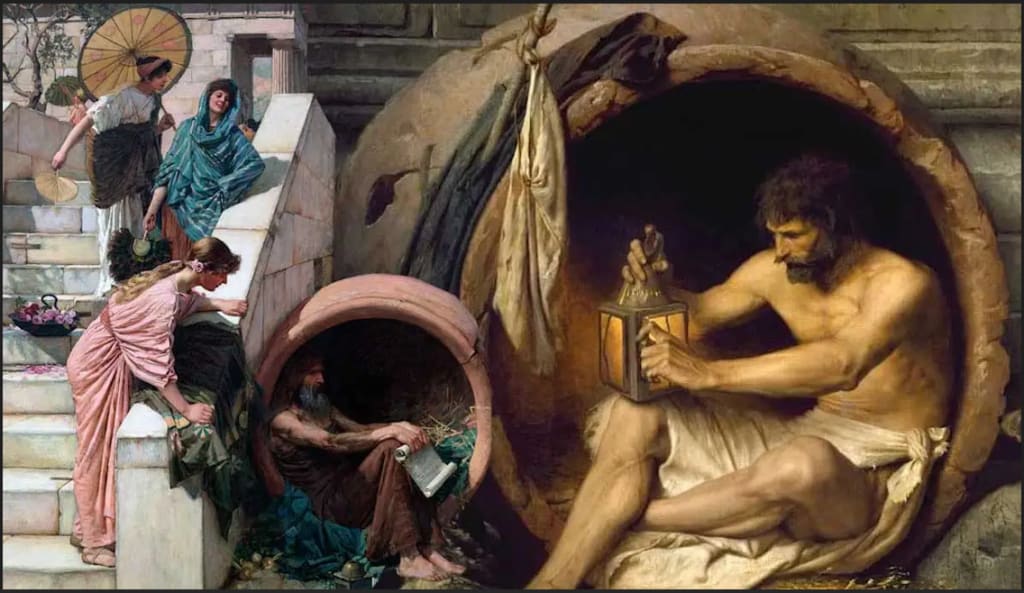Carried a lantern in daylight, claiming to search for an honest man
History

Diogenes of Sinope, the ancient Greek philosopher, stands out in history not only for his profound philosophical teachings but also for his eccentric and provocative public behavior. Born in Sinope around 412 or 404 BCE, Diogenes became one of the most famous and controversial figures of the Cynic school of philosophy, which espoused a simple and ascetic lifestyle in pursuit of virtue and wisdom.
Diogenes's public behavior was characterized by its radical departure from societal norms and conventions. He rejected material wealth and comfort, choosing instead to embrace poverty and austerity as essential components of a virtuous life. His most iconic display of this rejection of societal norms was his choice to live in a large ceramic jar (or barrel) in Athens, a gesture that symbolized his disdain for the trappings of wealth and status.
Beyond his unconventional dwelling, Diogenes engaged in a series of symbolic and often provocative acts designed to challenge and critique the values and beliefs of his contemporaries. One of the most famous anecdotes about Diogenes involves his public flaunting of social conventions. It is said that he walked through the streets of Athens in broad daylight carrying a lantern, claiming to be searching for an honest man. This act, both absurd and profound, served as a critique of the moral corruption and hypocrisy that he perceived in Athenian society.
Diogenes's use of the lantern as a metaphorical tool to illuminate the darkness of dishonesty and deceit resonated deeply with his philosophical worldview. He believed that true wisdom and virtue could only be found through honest self-examination and a rejection of societal conventions that he viewed as superficial and corrupting. By publicly challenging Athenian norms and values in such a dramatic and visible manner, Diogenes sought to provoke thought and introspection among his fellow citizens.
In addition to his symbolic gestures, Diogenes engaged in sharp and often biting wit, using humor and satire to undermine the pretensions of those in power and the philosophical schools of his time. He famously mocked Plato's definition of a human being as "a featherless biped" by plucking a chicken and presenting it in Plato's Academy, declaring, "Here is Plato's human being."
Despite—or perhaps because of—his confrontational and unconventional behavior, Diogenes garnered both admiration and notoriety in ancient Athens. His willingness to live according to his principles, regardless of societal expectations or consequences, earned him a reputation as the embodiment of Cynic philosophy. The term "Cynic" itself derives from the Greek word "kynikos," meaning "dog-like," reflecting Diogenes's belief in living a life free from the constraints of civilization and in harmony with nature.
Diogenes's legacy extends beyond his public antics to his philosophical contributions, which emphasized self-sufficiency, virtue, and the pursuit of eudaimonia (flourishing). His teachings influenced later philosophers, including the Stoics, who admired his emphasis on living in accordance with nature and accepting adversity with equanimity. His enduring influence underscores his lasting impact on Western philosophical thought, inspiring generations to challenge conventions and seek wisdom through introspection and simplicity.
In conclusion, Diogenes of Sinope's public behavior epitomized the radical spirit of Cynic philosophy and continues to fascinate and inspire to this day. His choice to live in a ceramic jar, carry a lantern in daylight, and challenge societal norms through provocative acts served not only to critique the values of his time but also to offer a timeless reminder of the importance of integrity, authenticity, and critical self-reflection in the pursuit of a meaningful life. Diogenes remains a symbol of philosophical defiance and intellectual courage, challenging us to question conventions and live with honesty and purpose.
About the Creator
Marveline Merab
“History never repeats itself. Man always does.”
― Voltaire
Enjoyed the story? Support the Creator.
Subscribe for free to receive all their stories in your feed.






Comments
There are no comments for this story
Be the first to respond and start the conversation.